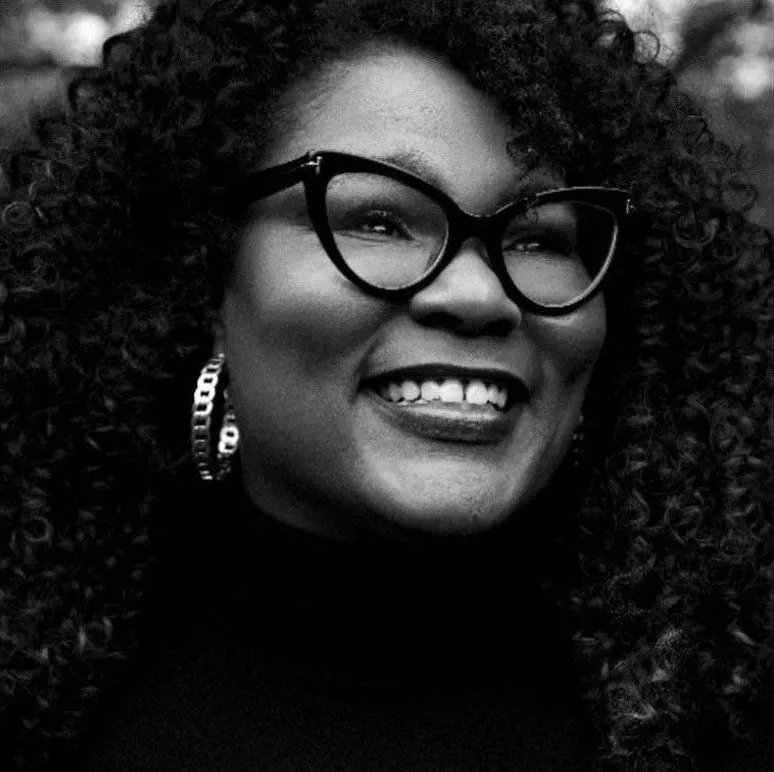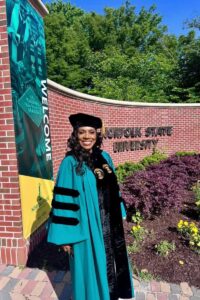When Beyonce and Jay-Z dropped “’03 Bonnie & Clyde,” Black women across the country could be heard in the club and driving to work belting out, “Down to ride ’til the very end, is me and my boyfriend.” The Carters weren’t the first or the last artists to glorify the image of a “ride-or-die” Black woman. From Baby Gangsta’s “Ride or Die” to The Game’s “Ryda,” Black artists, and especially those in hip-hop, have hailed the ideal Black woman as one who is willing to stick beside her man through it all.
But when “through it all” means enduring infidelity and abuse that require self-sacrifice on the part of Black women, the ride-or-die label is nothing to celebrate, says intersectional feminist and author Shanita Hubbard.
She found that while the visiting rooms at men’s prisons were usually full of supportive women, the visiting rooms in women’s prisons were much emptier.
“A lot of us have been conditioned to think that we have to earn our love and prove our worth by going above and beyond and doing anything for our significant others. It is absolutely a harmful trope, but it’s kind of been phrased as ‘Oh, that’s a good woman,’” Hubbard says.
Hubbard has been studying the impacts of the ride-or-die trope on Black women for years. As the author of “Ride or Die: A Feminist Manifesto for the Well-Being of Black Women,” she found that this harmful ideal has been part of the Black community for generations. It impacts so many aspects of Black women’s lives — from their personal relationships to their jobs, and even their health.
“You’ll hear some younger men say, ‘Well, we don’t have relationships like our grandparents anymore because our women are leaving,’ not realizing that our grandmothers probably went through and put up with a lot of abuse, but they didn’t have the resources to leave like we have now,” she says.
Professionally, the ride-or-die mentality can creep up in the form of Black women pushing themselves to work harder and longer hours to prove their value. As a result, across industries, Black women report feeling major burnout, which takes a toll on both their mental and physical health.
“The concept of a ride-or-die chick is a woman who goes above and beyond to prove her worth in different aspects of her life. We see this professionally when Black women are exhausted and tired, but we want to do everything with excellence, so we keep pushing ourselves,” Hubbard explains.
Empowering Incarcerated Black Women
Through a partnership with Urban Reads, a Baltimore-based bookstore focused on connecting incarcerated Black folks with affirming and inspiring reads, Hubbard is bringing the lessons of her “Ride or Die” manifesto to incarcerated Black women with the Ride Beyond program.
While writing “Ride or Die,” Hubbard had to become introspective and think about where she saw these harmful tropes of the ride-or-die — which she had unconsciously adopted herself — show up in her family, in her community, and in the music she listened to. The 7-week-long Ride Beyond program will similarly aid incarcerated Black women in looking within so that they can identify how self-sacrificing practices are holding them back.
“I had to hold up a mirror to myself. Women who are incarcerated in the Ride Beyond program can expect the same. They can expect dialogue that’s going to push them to be introspective. It’s a safe space where they’re going to be self-reflective, they’re going to be candid, and they’re going to be honest,” she says.
Women are the fastest-growing segment of the prison population. From 1980 to 2021, The Sentencing Project documented a 525% increase in women’s imprisonment in the United States, with the vast majority being Black women. Hubbard chose to focus on incarcerated Black women with the Ride Beyond program because, though they feel the effects, Black women are often left out of conversations about incarceration and prison reform.
Intersectional feminism is only powerful when we’re centering the most marginalized among us, so that’s always the framework that I lean into.
Throughout her life, Hubbard has supported an ex-partner and family members through incarceration. However, she found that while the visiting rooms at men’s prisons were usually full of supportive women, the visiting rooms in women’s prisons were much emptier.
“There was also a time I remember visiting my female cousin who was locked up, and it came as no surprise that the visiting rooms were not nearly as crowded. They were not getting nearly as much support, and there certainly were not a lot of men there to show up for them. A lot of times, we forget about incarcerated women who are locked up and that they need these conversations we are having,” Hubbard says. “I’m not suggesting that we take the lens off of our incarcerated brothers. I’m suggesting that we expand the lens so that we are also centering Black women who are incarcerated.”
Through Black-women-led and centered teachings, Hubbard says the Ride Beyond program will leave incarcerated Black women feeling “more empowered over their lives. Even while they are incarcerated, I want them to have a sense of empowerment. I want them to feel seen. I want them to feel loved through my words. I want them to feel loved and supported through this community initiative.”
After completing the program, the women will be invited to participate in a graduation ceremony to celebrate their efforts and receive $125 on their commissary. A valedictorian, an incarcerated Black woman who has shown specific leadership skills and helped to facilitate conversation throughout the program, will also be chosen to speak at the graduation and receive $250 on her commissary.
Folks are invited to support Ride Beyond by purchasing Hubbard’s “Ride or Die” book from Urban Reads. Hubbard and Urban Reads are starting the initiative at a women’s prison in Maryland, with hopes to expand and reach more incarcerated Black women across the country.
“It’s such a pleasure to center Black women in my work. Even before I wrote this book, all of my work has centered Black women because we deserve it,” Hubbard says. “Intersectional feminism is only powerful when we’re centering the most marginalized among us, so that’s always the framework that I lean into.”




